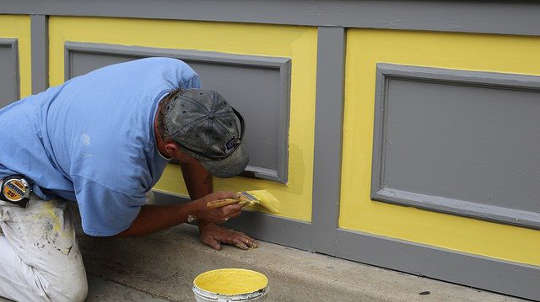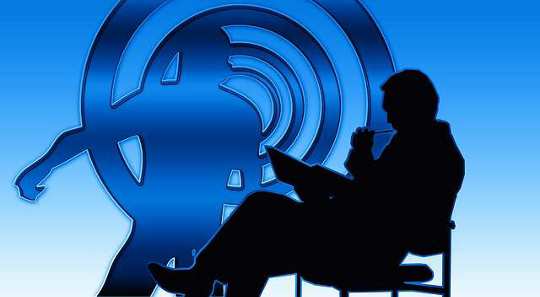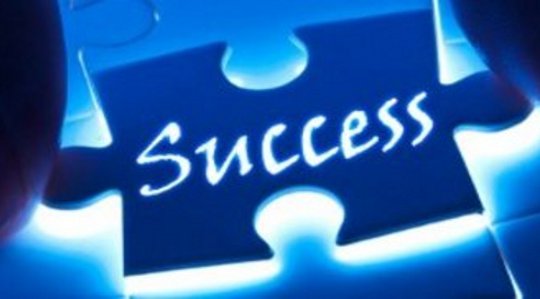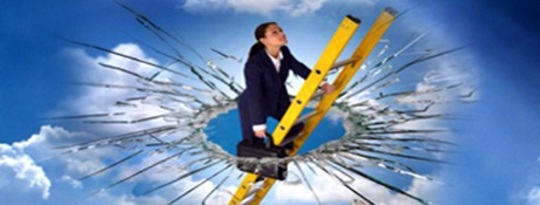 Do you wake in the morning and groan because you dread your day job? As you rush out the door, you scowl deeper, anticipating another awful day at work. Such an attitude, which I too have harbored, is harmful, even damaging, to our psyche, our present job, and our future creative work.
Do you wake in the morning and groan because you dread your day job? As you rush out the door, you scowl deeper, anticipating another awful day at work. Such an attitude, which I too have harbored, is harmful, even damaging, to our psyche, our present job, and our future creative work.
 Many people hear the title Think and Grow Rich and immediately connect it with the idea of acquiring material wealth. Yet, interestingly enough, Napoleon Hill doesn’t devote a lot of time in his book to the actual making of money. For Hill, rich had a different meaning or, at the very least, a much broader one.
Many people hear the title Think and Grow Rich and immediately connect it with the idea of acquiring material wealth. Yet, interestingly enough, Napoleon Hill doesn’t devote a lot of time in his book to the actual making of money. For Hill, rich had a different meaning or, at the very least, a much broader one.
 A new study points to both the limits and potential we have in visually representing ourselves—in situations that include dating, career-networking sites, and social media posts.
A new study points to both the limits and potential we have in visually representing ourselves—in situations that include dating, career-networking sites, and social media posts.
 Disruptive technologies are nothing new. From the development of steam power in the early 1800s to today’s digitally-enriched world, the impact of technology on the employment landscape has been substantial.
Disruptive technologies are nothing new. From the development of steam power in the early 1800s to today’s digitally-enriched world, the impact of technology on the employment landscape has been substantial.
 Consumption. By a strange shift of meaning, this 19th-century word describing a serious and often fatal disease is the same word used now for a way of life focused on material goods. Is it time to bring back its negative, and often deadly, associations into our public discourse?
Consumption. By a strange shift of meaning, this 19th-century word describing a serious and often fatal disease is the same word used now for a way of life focused on material goods. Is it time to bring back its negative, and often deadly, associations into our public discourse?
- By Greg S. Reid
 No matter who you are or how skilled you may be in your occupation, there will be times when the going is hard, and unpleasant circumstances will overtake you. Now, if you yield easily to these obstacles you may as well write yourself off as far as becoming a great success is concerned.
No matter who you are or how skilled you may be in your occupation, there will be times when the going is hard, and unpleasant circumstances will overtake you. Now, if you yield easily to these obstacles you may as well write yourself off as far as becoming a great success is concerned.
 Failure can be a positive element in one’s eventual success. This principle has been proven throughout history among some of the greatest entrepreneurs. The great Henry Ford wasn’t a stranger to failure. Before founding Ford Motor Company, Ford’s earlier business endeavors all failed and left him broke.
Failure can be a positive element in one’s eventual success. This principle has been proven throughout history among some of the greatest entrepreneurs. The great Henry Ford wasn’t a stranger to failure. Before founding Ford Motor Company, Ford’s earlier business endeavors all failed and left him broke.
 As the U.S. continues to recover from the financial crisis started over seven years ago, the prospect of "too big to fail" banks still lingers because no real reforms have been made in the financial sector.
As the U.S. continues to recover from the financial crisis started over seven years ago, the prospect of "too big to fail" banks still lingers because no real reforms have been made in the financial sector.
- By Joel Fotinos
 I’ve found that many people have no idea what they want to do with their life. They either feel overwhelmed with possibilities and don’t know where to start, or they feel like there is nothing specific that is calling to them. Either way, they are stuck where they are.
I’ve found that many people have no idea what they want to do with their life. They either feel overwhelmed with possibilities and don’t know where to start, or they feel like there is nothing specific that is calling to them. Either way, they are stuck where they are.
 Manifestation became an exciting game of Synchronicity Bingo: request and delivery. Every product that I wanted miraculously popped into view. Bingo. Eventually, finding and receiving items became effortless.
Manifestation became an exciting game of Synchronicity Bingo: request and delivery. Every product that I wanted miraculously popped into view. Bingo. Eventually, finding and receiving items became effortless.

What is money if not a state of mind? If we view money as an energy, naturally flowing to us as we earn a livelihood, then we should be concerned with the quality of the service we give to others and the amount money will flow.
 We are all consumers of expectations. They are easy to come by — from parents, family, friends, the media — and many are self-created. Expectations are pervasive in our lives, and most of us are conditioned to be driven by them and to attempt to realize them. Our expectations then become our compass...
We are all consumers of expectations. They are easy to come by — from parents, family, friends, the media — and many are self-created. Expectations are pervasive in our lives, and most of us are conditioned to be driven by them and to attempt to realize them. Our expectations then become our compass...

Deciding to disclose information about a non-obvious disability at work is complicated and potentially risky, no matter what you do for a living. For people with a mental health issue, like bipolar disorder or PTSD where stereotypes and bias are prevalent, the risk can be even greater.
- By Robert Reich

I get lots of mail about whether college is worth the cost. The answer is unequivocally yes, but with one big qualification. I’ll come to the qualification in a moment but first the financial case for why it’s worth going to college.

Health and social workers often choose their profession because they want to help people. But seeing trauma and suffering on a regular basis can have a deep impact on these workers. “Compassion fatigue” is a response to the stress of caring for people at times of crisis and is often referred to as the cost of caring.

If someone said your organization could eliminate email and meetings, fire the bosses, go to a four day work week, and thrive, what would you think? Where’s the punchline, right? Well, there is no punchline. Many companies are taking such steps.
- By Sam Bennett

The nice thing about making a list is that I get the to-do chatter out of my head and onto a piece of paper. But there’s no way to prioritize. There’s no indication of how important anything is, how much time each task might take, and the order in which I ought to attack the list.
- By Eric Maisel

As life gets busier and more complex, we all crave something larger and more meaningful than just checking off another item on our to-do lists. Traditionally we’ve looked to religion and spirituality for a sense of life purpose, but in our secular age...
- By Jim Donovan
 Over the years I've made a practice of studying people who have achieved something I'd like to accomplish. Whether in health, fitness, business, or even relationships, if I want to achieve a particular result, I can find someone who achieved it and learn to do what they did. This idea, known as modeling...
Over the years I've made a practice of studying people who have achieved something I'd like to accomplish. Whether in health, fitness, business, or even relationships, if I want to achieve a particular result, I can find someone who achieved it and learn to do what they did. This idea, known as modeling...

I know that it may be tempting sometimes to give up when Life just seems to be too tough, but the moment we give up, our inner life-energy starts to drain away and it then becomes even harder to move through Life’s challenging times. Instead we have to...

For those who might have missed it, this was Microsoft CEO Satya Nadella’s advice to women uncomfortable with the thought of requesting: "It’s not really about asking for the raise but [about] knowing and having faith that the system will actually..."

Many stories are told of the power of the subconscious when directed in faith. Demonstrations often come at the eleventh hour because man then lets go, that is, stops reasoning, and Infinite Intelligence has a chance to work.

 The world’s move into the mobile post-PC age has accelerated, it seems, after Apple’s
The world’s move into the mobile post-PC age has accelerated, it seems, after Apple’s 














